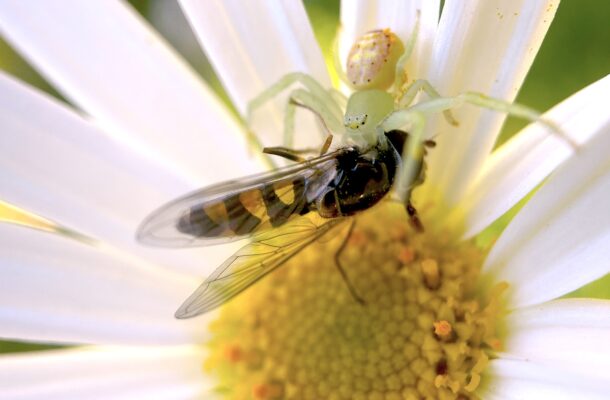No spray spring

Invertebrates such as insects, spiders, centipedes, millipedes, worms, snails and their relatives are essential for healthy ecosystems.
There are currently over 100,000 species of invertebrates in Australia and the vast majority are beneficial; providing vital ecosystem services such as pollination, decomposition, and predation of pests.
However, a very small handful of species become pests which, without management, can be a public health threat. These include certain species of mosquitoes and cockroaches while some ants and termites can damage property. The management of invertebrates in cities is therefore a fine balance between controlling damaging pests and encouraging beneficial species.
Broad-spectrum pesticides are currently the most common way that people deal with pests in the city. Unfortunately, these chemicals are known to impact beneficial invertebrate species, contaminate soils and waterways, impact human health and affect animals higher in the food chain including birds, lizards and mammals.
Also, in many cases, the application of insecticides is not actually necessary, as the species being targeted is not a pest or is not causing enough damage to warrant the use of harmful chemicals.
In spring we often see advertising encouraging people to get their garden sprayed before the pests move in, but Dr Lizzy Lowe from Invertebrates Australia says that many of the species targeted are not pests: “some people have a fear of having any insect or spider in their gardens, but they are so important for our ecosystems, and the vast majority of them wont hurt you!”
Integrated pest management (IPM) is one way to sustainably control pests without excessive pesticide use and can be applied by residents, pest control practitioners, businesses, communities and local councils.
The key is to “only apply chemicals when absolutely necessary and when you do need to, choose products that specifically target the pest that’s causing you problems, rather than also taking out all the good invertebrates, many of whom will actually help you manage pests” says Dr Lowe.
Unfortunately at the moment, even though most people in cities like the idea of being ecofriendly, many still resort to insecticides because they don’t know enough about invertebrates, and the chemicals are cheap and easy, despite the environmental and health impacts.
This spring, Invertebrates Australia are encouraging residents and gardeners across Australia to put down the insect spray and to learn a bit about the invertebrate life in their back gardens to manage pests and encourage beneficials more effectively and safely. Its media campaign will consist of a range of sustainable pest management advice, introducing people to fascinating backyard “bugs” and connecting with other organisations and individuals who are working hard to keep our cities insecticide free.
Invertebrates Australia have a number of specialists on sustainable pest management and all different types of invertebrates who are very happy to answer any questions.
Open Forum is a policy discussion website produced by Global Access Partners – Australia’s Institute for Active Policy. We welcome contributions and invite you to submit a blog to the editor and follow us on Twitter, Facebook, Linkedin and Mastadon.













